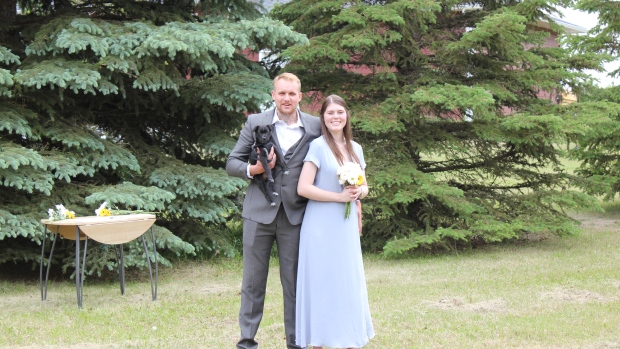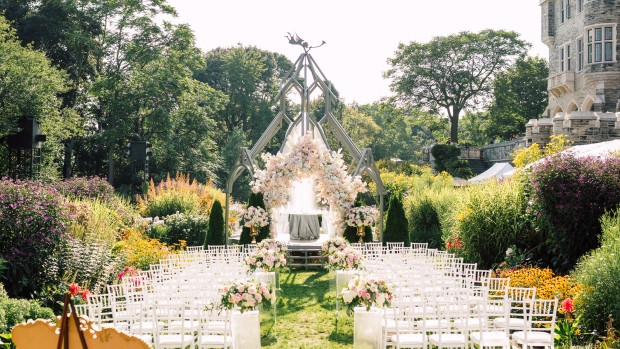Apr 9, 2021
From 200 cakes to four: How COVID-19 pummeled the wedding industry
, BNN Bloomberg
Our bottom line has been hit substantially: Entertainment group behind Casa Loma
Recently-married Martha Langford would describe herself as a spontaneous individual. However, from finding an officiant over Kijiji to never meeting her fiancé’s family ahead of her wedding, COVID-19 added a whole new layer to her wedding planning process.
“My husband asked me, ‘Hey do you want to get married?’, and I said, ‘Yeah I could do that’ back in April. But it was a bit harder to be spontaneous with planning in the middle of the pandemic,” the 22-year-old assistant producer at ViaVid Communications, said in a phone interview.
“The biggest thing for us was that our family and friends are all in Ontario and Halifax but we’re out in Saskatchewan. We didn’t want them to take the risk to come over so we called our family over FaceTime as much as we could and sent videos throughout the whole ceremony in our backyard.”

The COVID-19 pandemic has caused many couples to postpone their wedding plans due to lockdowns and restrictions on social gatherings across the country. That created a ripple effect for many companies that rely on weddings for business, and as a result some owners are having to consider closing up shop.
- Divorce activity 'never been as busy' as COVID stirs asset disputes
- Pattie Lovett-Reid: The prenup talk can be tough, but necessary
MARRIAGE STORIES
In 2019, there were 49,187 registered marriages between January and September in Ontario. In comparison, only 28,615 took place during the same period in 2020.
Currently in Ontario grey zone areas, such as Toronto and Peel region, only 50 guests are allowed at an outdoor wedding, and capacity is limited to 15 per cent for indoor ceremonies. Indoor receptions are banned, and outdoor receptions are subject to social gathering limits restricting groups to no more than five people.
COVID-19 WEDDING RESTRICTIONS
| Region | Restrictions |
|---|---|
| British Columbia | Maximum of 10 people (Does not include event organizer and staff) |
| Alberta | Maximum of 10 people (Does not include event organizer and staff) |
| Saskatchewan | Maximum of 30 people |
| Manitoba | Maximum of 25 people (Does not include officiant, photographer or videographer) |
| Ontario | Maximum 15 per cent capacity of the room (Includes officiant and staff) |
| Quebec | Maximum of 25 people |
| New Brunswick | Maximum 50 per cent capacity of the room |
| Nova Scotia | Maximum 50 per cent capacity of the room (Up to 100 people indoors) |
| Prince Edward Island | Maximum of 50 people |
| Newfoundland and Labrador | Maximum of 50 people |
One of Toronto’s most-coveted wedding venues is Casa Loma. Perched high above the downtown core with a view of the CN Tower, the 107-year-old landmark features a picturesque castle and estate gardens that’s a popular location for television shows such as Handmaid’s Tale and Hemlock Grove.
The cost of renting Casa Loma starts at around $25,000-30,000 for an average 100-person wedding and the price goes up from there.
However, even the most exclusive venues haven’t been immune to the financial hit of the COVID-19 pandemic.
The entertainment group behind Casa Loma said it took a dramatic hit to its bookings during 2020, with 85 per cent fewer wedding ceremonies and receptions versus 2019 at the venue.
“Obviously, the bottom line has been hit substantially, as all event spaces have lost an entire year of income. There have been some government subsidies which were available and some loans; but, unfortunately, these were not available to all venues,” Nick Di Donato, president and CEO of the Liberty Entertainment Group, said by email.
“What we, as an industry, have to do is minimize our losses to the greatest extent possible, so we will be ready to have our strongest year in decades for 2022. There will be an overwhelming request for weddings as many have put these plans on hold for nearly two years.”

Di Donato isn’t alone in anticipating a massive wedding rush next year.
A study by insurance comparison platform Hellosafe.ca suggests the Ontario wedding industry could generate record sales of over $2 billion in 2022 with an expected surge of rescheduled weddings that were cancelled in 2020 and 2021.
Sam Hepperle is one of those brides who’s looking to book ahead for her ceremony, but she’s having to look a few years out due to the surge in venue reservations.

“There’s a backlog of those postponed pandemic weddings and now quarantine engagements so as a result most of the venues we’ve looked at are booked solid,” said the 23-year-old audio visual operator at Osgoode Professional Development in a phone interview.
“We haven’t done too much planning yet because everything is just so uncertain, day-by-day everything is changing. COVID-19 has given us no choice but to look further out to late 2023 or 2024.”
Not every small business owner thinks they can keep the lights on until the speculated wedding boom.
Specialty cake maker Olivia Nguyen experienced a plunge of sales during the COVID-19 pandemic with many clients rescheduling orders. In a typical year, she bakes cakes for more than 200 weddings; but in 2020 she only received four orders.
“I have been in business for 15 years and COVID-19 has completely decimated the wedding industry like nothing we ever expected,” the founder and designer for I Do! Wedding Cakes said in a phone interview.

“I wouldn’t say I am a former small business owner but I have just decided this spring that I need to take the steps to close my doors permanently.”
The wedding industry is also built upon deposits for everything from venues to cakes to flowers, which many couples shelled out for before their nuptials were put on hold. Casa Loma, for example, requires a standard deposit of $5,000, which is due upon signing the contract.
The Hellosafe.ca report estimated that Ontario’s wedding industry lost out on $780 million in revenue last year, representing almost a 40 per cent year-over-year drop.
According to the same study, the average Ontarian spends between $20,000 to 40,000 on their big day, and many small businesses rely on those massive budgets to help stay afloat.
“You don’t want to dwell on it too long as it’s just heartbreaking to think about. There was a time when we thought if the lockdown wasn’t too long we could salvage those lost wedding orders,” Nguyen said.
“I waited until this spring before I started thinking about pulling the plug because the worst thing for a small business owner is to live in limbo with no definite answers on when the industry will be back.”



